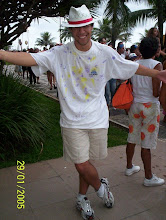In the subway, I was observing a bunch of teens texting their life away in cell phones and I thought of a bunch of issues related to our present times. It started with the invention of telegraphs, everyone: the world since then - and particularly nowadays - is ever more virtual. We make skype calls, we text a lot, use our cell phones, our email accounts, woah! We spend most of our time each day in front of a virtualizing gadget. Life does not happen in the present anymore, and that's because we are in a different time, place and "mind". In other words, the three dimensions of the present, namely temporality, spatiality, and "mind dimension".
The virtualization of the world is taking us far from the minutes we are actually living, from the place we physically are (this afternoon I was crossing the streets and texting, without being aware of my surrondings - a car accident could easily happen...) and from the connection of these both through our mind, since we are always thinking about something else - appointments, deadlines, grades. This too takes us away from the here and now. It's becoming increasingly difficult to answer "where are you?" when asked; imagine "who are we? Where do we come from? Where are we going?". Such a shame for philosophy.
Humans in the present are gradually substituting their concrete/physical ways of relating to each other to more virtual ways. Kids are playing games that actually simulate relationships (The Sims); virtual social networks are literally everywhere. People often live in the same house but don't talk to each other.
Is this increasing virtualization a form of Social Virtual Capital? Does it have the same inherent neutrality that the traditional Social Capital concept has? Can we use it for health promotion/disease prevention? Can we manage somehow to be free from those trends of virtualization, or it's something that we have to adapt and learn to live with?
Many questions. Few answers. Don't mind if no one responds. After all, virtualizations don't substitute real conversations.
Alê
quarta-feira, 23 de setembro de 2009
Assinar:
Postar comentários (Atom)

I hate virtualizations!
ResponderExcluirTry to see a very old film,"Denise is calling",from the early 90's!
ResponderExcluir